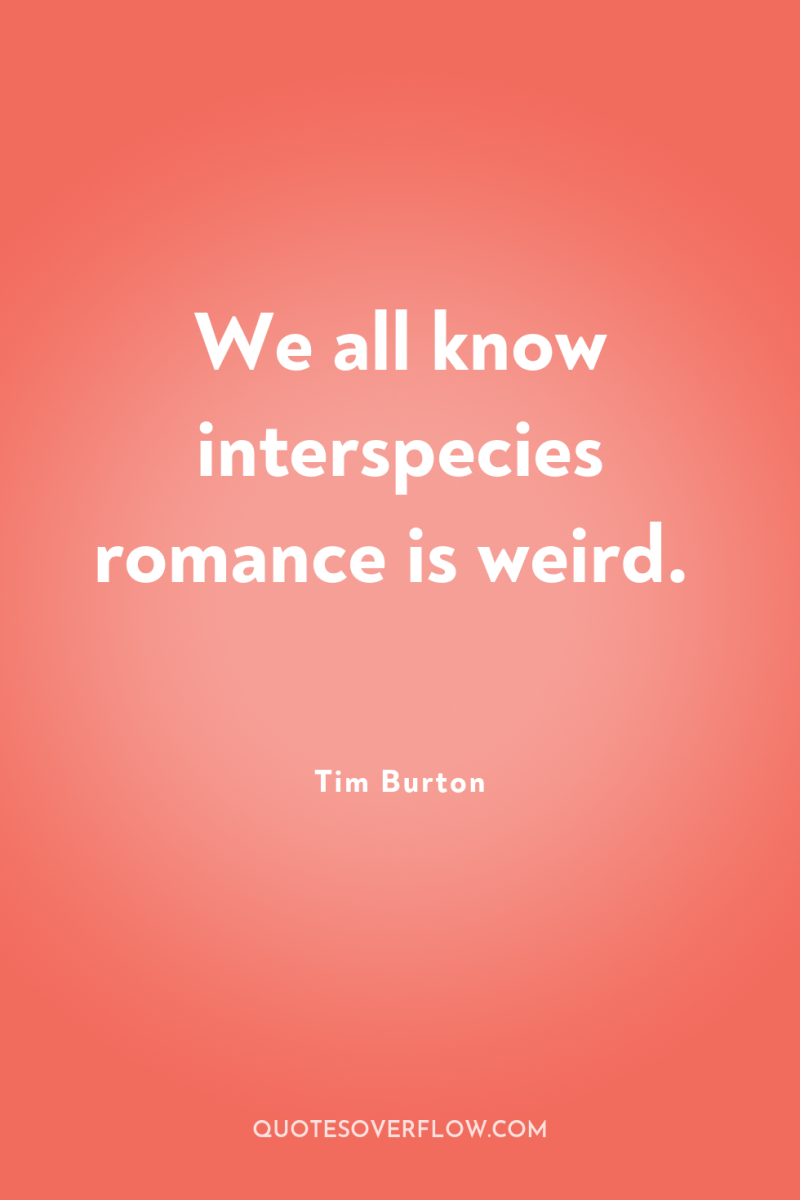
1
We all know interspecies romance is weird.Tim Burton
2
There were three things sought by invaders who crossed oceans to discover America. Those were gold, gospel, glory. There are four things sought by aliens who crossed heavens to discover planet earth. Those are gold, gospel, glory, gene.Toba Beta
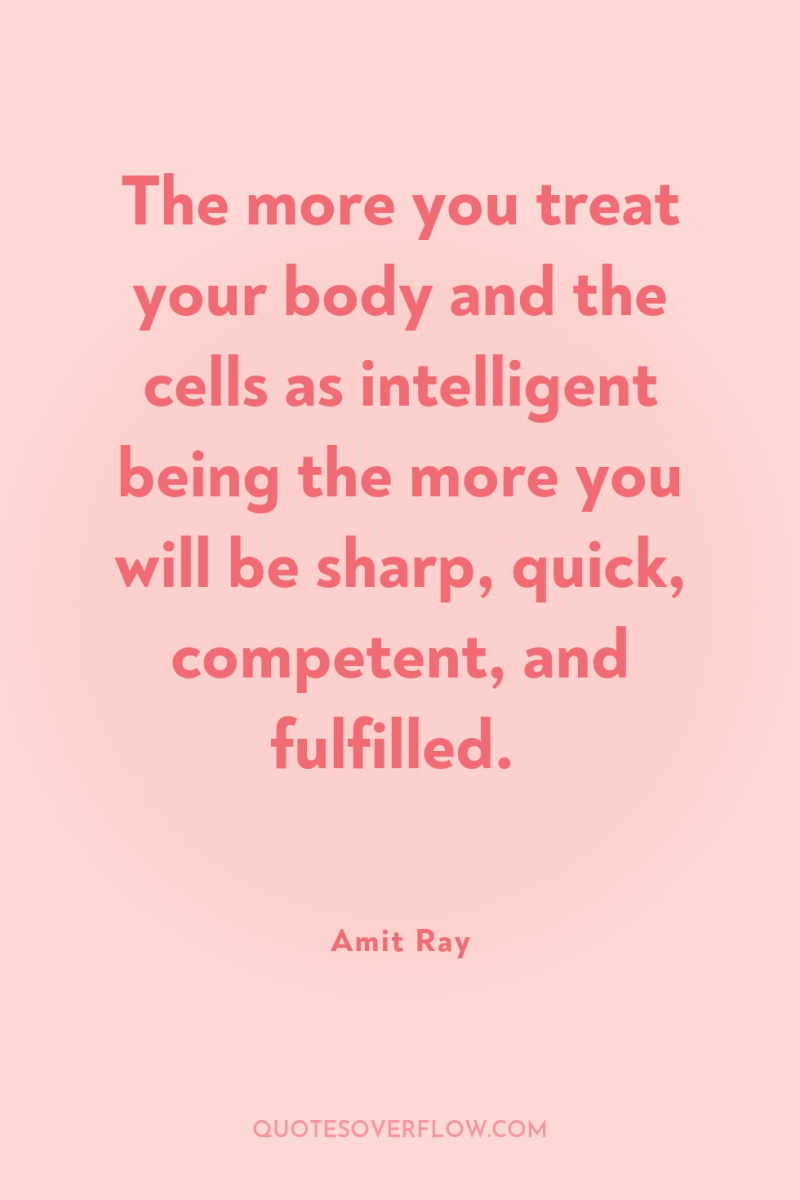
3
The more you treat your body and the cells as intelligent being the more you will be sharp, quick, competent, and fulfilled.Amit Ray
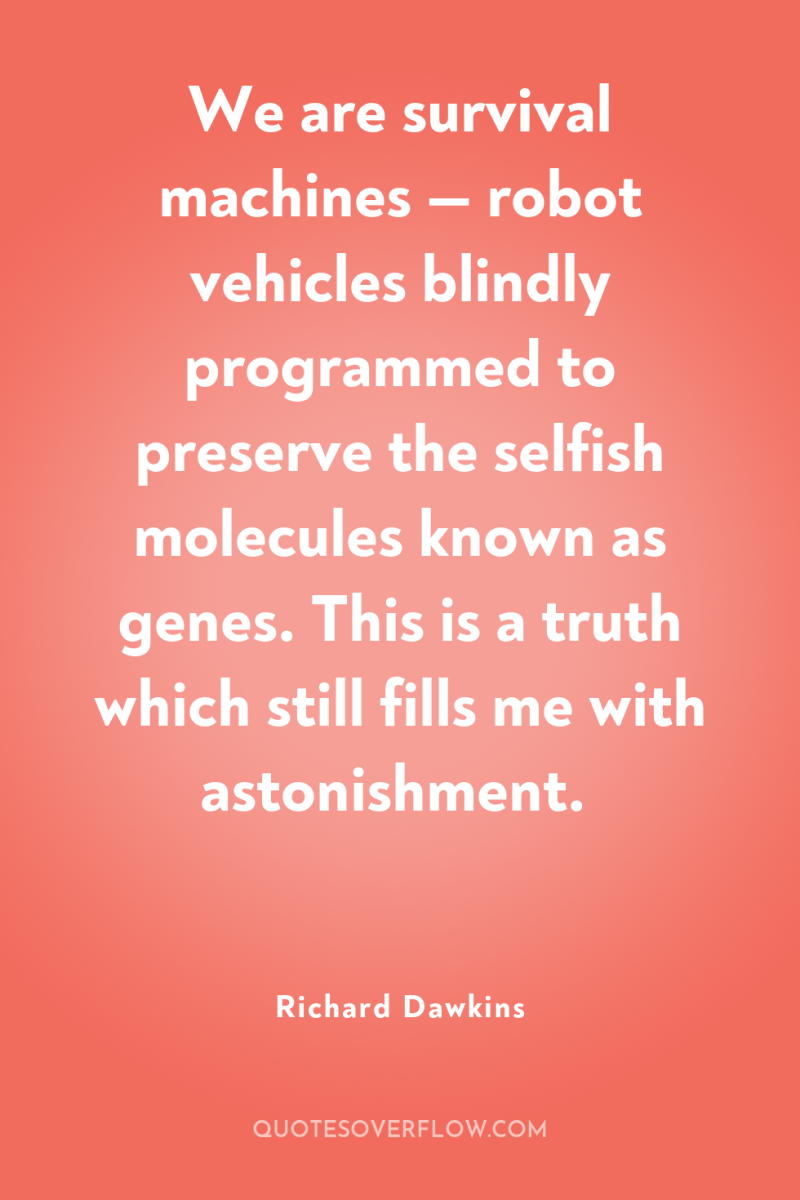
5
We are survival machines — robot vehicles blindly programmed to preserve the selfish molecules known as genes. This is a truth which still fills me with astonishment.Richard Dawkins
6
Every time you understand something, religion becomes less likely. Only with the discovery of the double helix and the ensuing genetic revolution have we had grounds for thinking that the powers held traditionally to be the exclusive property of the gods might one day be ours.. ..James D. Watson
7
I placed some of the DNA on the ends of my fingers and rubbed them together. The stuff was sticky. It began to dissolve on my skin. 'It's melting -- like cotton candy.' 'Sure. That's the sugar in the DNA, ' Smith said. 'Would it taste sweet?' 'No. DNA is an acid, and it's got salts in it. Actually, I've never tasted it.' Later, I got some dried calf DNA. I placed a bit of the fluff on my tongue. It melted into a gluey ooze that stuck to the roof of my mouth in a blob. The blob felt slippery on my tongue, and the taste of pure DNA appeared. It had a soft taste, unsweet, rather bland, with a touch of acid and a hint of salt. Perhaps like the earth's primordial sea. It faded .Timothy Ferris
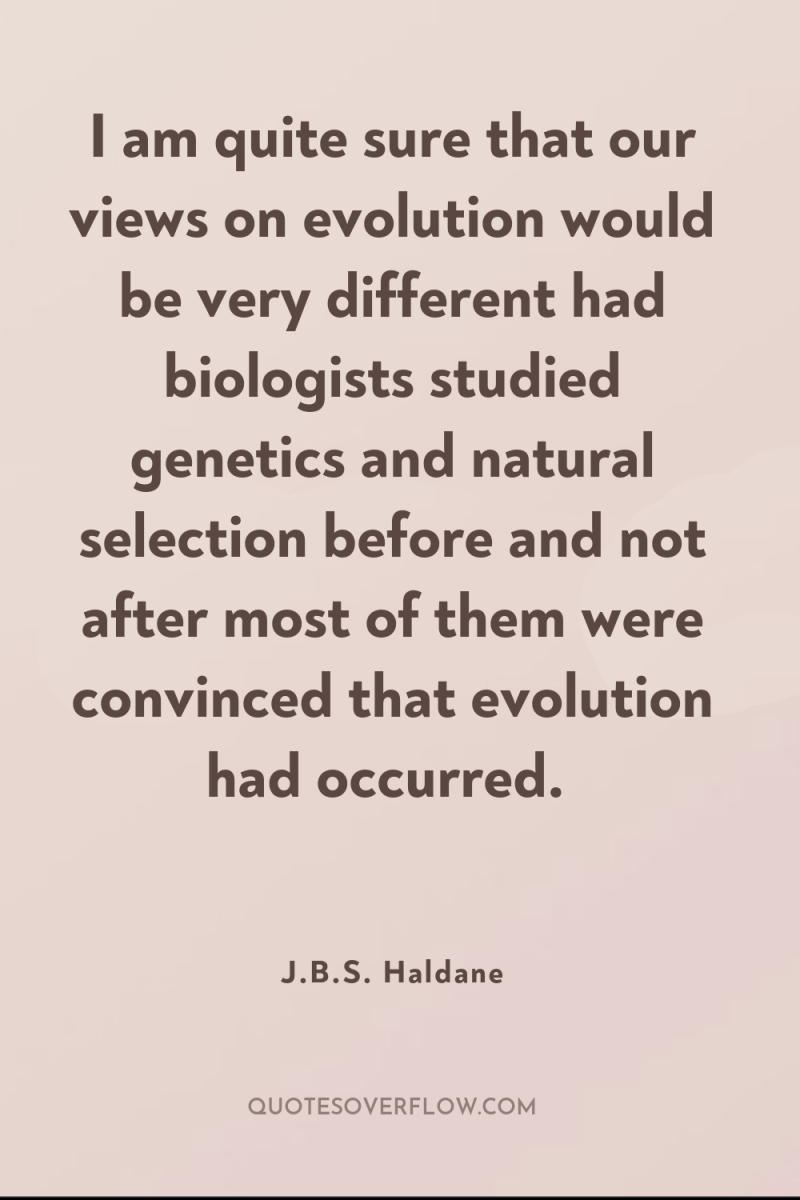
8
I am quite sure that our views on evolution would be very different had biologists studied genetics and natural selection before and not after most of them were convinced that evolution had occurred.J.B.S. Haldane
9
A cell has a nucleus and some other parts like membranes, plasmas and other stuff. Its energy is made up of protons, neurons and electrons. Genetic scientists, however, have discovered that the majority of a cell is made up of something unknown. Something akin to space filled with electromagnetic fibers of light. The human body is made up of some 37 trillion cells. What do you think you are made of? Who do you think you are? .Kate McGahan
10
The universe is not only stranger than we imagine, it is stranger than we can imagine.Unknown
11
We live in an exciting time. We now know more than ever about our biology and about our history, allowing us to peer into the future with greater clarity than has previously been possible. But at the same time, the changes we are undergoing, brought about by our own advances in technology, medicine, transportation-- and by the growing impact we are having on the world around us-- mean that we live in a time in which the future looks increasingly less like the past. We have become an odd species, indeed, but our story is not yet over. Like all species, Homo sapiens continues to evolve, so there is one thing we can say with certainty: the people of tomorrow will not be the same as the people of today.Scott Solomon
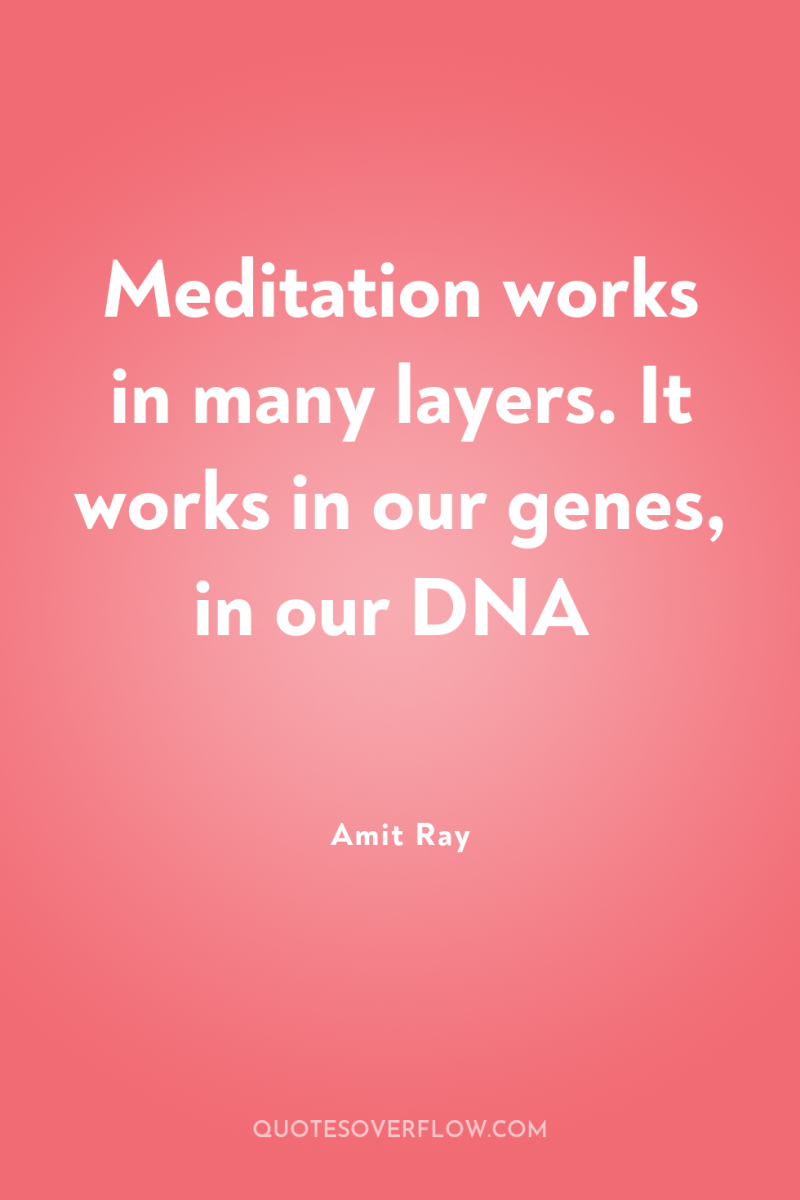
12
Meditation works in many layers. It works in our genes, in our DNAAmit Ray
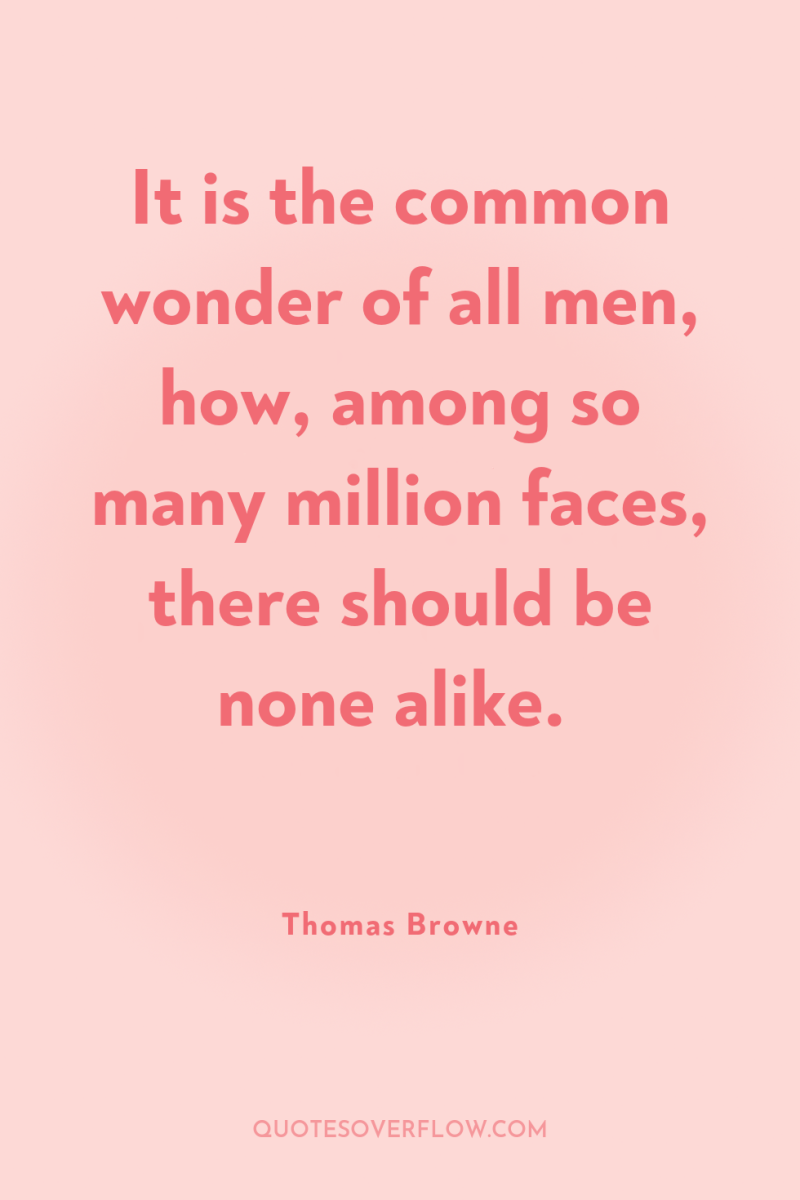
13
It is the common wonder of all men, how, among so many million faces, there should be none alike.Thomas Browne
14
If the history of the last century taught us the dangers of empowering governments to determine genetic “fitness” (i.e., which person fits within the triangle, and who lives outside it), then the question that confronts our current era is what happens when this power devolves to the individual. It is a question that requires us to balance the desires of the individual– to carve out a life of happiness and achievement, without undue suffering– with the desires of a society that, in the short term, may be interested only in driving down the burden of disease and the expense of disability. And operating silently in the background is a third set of actors: our genes themselves, which reproduce and create new variants oblivious of our desires and compulsions– but, either directly or indirectly, acutely or obliquely, influence our desires and compulsions. Speaking at the Sorbonne in 1975, the cultural historian Michel Foucault once proposed that “a technology of abnormal individuals appears precisely when a regular network of knowledge and power has been established.” Foucault was thinking about a “regular network” of humans. But it could just as easily be a network of genes.Siddhartha Mukherjee
15
Our highest contribution is making this world peaceful and happy. That comes when we can radiate peace and harmony from every cell, gene and DNA of our body.Amit Ray
16
Enlightenment is making every cell, gene and DNA as the radiator of peace and harmony.Amit Ray
17
We are often given pills or fluids to help remedy illness, yet little has been taught to us about the power of smell to do the exact same thing. It is known that the scent of fresh rosemary increases memory, but this cure for memory loss is not divulged by doctors to help the elderly. I also know that the most effective use of the blue lotus flower is not from its dilution with wine or tea — but from its scent. To really maximize the positive effects of the blue lily (or the pink lotus), it must be sniffed within minutes of plucking. This is why it is frequently shown being sniffed by my ancient ancestors on the walls of temples and on papyrus. Even countries across the Orient share the same imagery. The sacred lotus not only creates a relaxing sensation of euphoria, and increases vibrations of the heart, but also triggers genetic memory - and good memory with an awakened heart ushers wisdom. .Suzy Kassem
18
Diabetes is passed that way -- over and down, like a knight in chess.Maile Meloy
19
At sixteen, you still think you can escape from your father. You aren't listening to his voice speaking through your mouth, you don't see how your gestures already mirror his; you don't see him in the way you hold your body, in the way you sign your name. You don't hear his whisper in your blood.Salman Rushdie
20
It’s truly interesting to observe how genetics works in families, and what a huge lottery it is to inherit some of our relatives’ appearance features.Sahara Sanders
21
All modern humans are related to what scientists call "Mitochondrial Eve." This refers to our common matrilineal ancestor. She lived approximately 200, 000 years ago and depending on how you estimate the length of a generation, we are only 5, 000 to 10, 000 generations from one another. To put it another way, each of us is a cousin of one another at most 10, 000 times removed. And yes, Mitochondrial Eve lived in Africa, so, in a very real way, we are all Africans. .Desmond Tutu
22
The family trees of all of us, of whatever origin or trait, must meet and merge into one genetic tree of all humanity by the time they have spread into our ancestries for about 50 generations.Guy Murchie
23
We both lacked the same thing in our childhoods - the love of a father... We both sought to fill that lack in our adult lives with family and love, as everyone does, but also with thrills and sometimes periods of recklessness. Luckily, I have always come back from my recklessness. Tommy Darling did not.Alan Cumming
24
Bhramari Om Chanting or Humming Om chanting sends positive messages to the brain and the cells in our body and can actually reprogram our health and behavior.Amit Ray
25
...because the great beauty of embryo development, the bit that human beings find so hard to grasp, is that it is a totally decentralised process...no cell need wait for instructions from authority; every cell can act on its own information and the signals it receives from its neighbours. We do not organise societies that way... Perhaps we should try.Matt Ridley
26
Eventually, her designed genetic material will be implanted into my egg, which first would have had my genetic material removed. Then my mother could become my baby. And someday, when I get old, I can become her baby. Then she will be mine, and I will be hers.Jack Gantos
27
If you are living in the electrified wireless west, then you are living a very abnormal lifestyle that your genetics has no adaptation to.Steven Magee
28
Shake off the tonnage of old genetics, nitpicking naysayers and hand-me-down Egos hoarding junk in the back of your mind. Be a Friday night liberty set loose on Monday morning.Laurie Perez
29
I know genes are a big deal, son, but they're not the be-all and end-all." Rob slowed to a halt at the lights, wishing the dickhead behind would back off. "If they were, you'd be in a seafood salad and I'd be in prison.Karen Traviss
30
It is my belief that the basic knowledge that we're providing to the world will have a profound impact on the human condition and the treatments for disease and our view of our place on the biological continuum.J. Craig Venter
31
Imagine that the genome is a book. There are twenty-three chapters, called CHROMOSOMES.Each chapter contains several thousand stories, called GENES.Each story is made up of paragraphs, called EXTONS, which are interrupted by advertisements called INTRONS.Each paragraph is made up of words, called CODONS.Each word is written in letters called BASES.Matt Ridley
32
Meditation is not just blissing out under a mango tree. It completely changes your brain and therefore changes what you are.Matthieu Ricard
33
The human body when kept in an indoor environment of low lux light will not realize that it is daytime, as it cannot sense the increasing levels of daylight that the genetics are accustomed to. As such, by late morning your body may start sending a signal for you to sleep!Steven Magee
34
In microbiology the roles of mutation and selection in evolution are coming to be better understood through the use of bacterial cultures of mutant strains.Edward Tatum
35
Some say we are not like humans but we are more like them than we are different. Man and animals are in the same species as mammals as they have mammary glands that produce the milk to nurse their young. Their lungs breathe air and their blood is warm. They are vertebrates in that their skeletal system and well-designed spines hold their bodies together. Each cell is made of molecules, each molecule is made of atoms, and each atom is made of protons, neutrons and mostly electrons, which are made of waves of fibered light.Kate McGahan
36
The human has genetic adaptation to natural electromagnetic radiation. Increasing, reducing or removing the natural radiation exposures results in a sickened human that may progress onto a diseased state.Steven Magee
37
At bottom every man knows well enough that he is a unique being, only once on this earth; and by no extraordinary chance will such a marvelously picturesque piece of diversity in unity as he is, ever be put together a second time.Friedrich Nietzsche
38
A four-letter alphabet called DNA.Matt Ridley
39
In evolutionary terms, that means we asked for it.Sharon Moalem
40
The problem with racial discrimination, though, is not the inference of a person's race from their genetic characteristics. It is quite the opposite: it is the inference of a person's characteristics from their race. The question is not, can you, given an individual's skin color, hair texture, or language, infer something about their ancestry or origin. That is a question of biological systematics -- of lineage, taxonomy, of racial geography, of biological discrimination. Of course you can -- and genomics as vastly refined that inference. You can scan any individual genome and infer rather deep insights about a person's ancestry, or place of origin. But the vastly more controversial question is the converse: Given a racial identity -- African or Asian, say -- can you infer anything about an individual's characteristics: not just skin or hair color, but more complex features, such as intelligence, habits, personality, and aptitude? /I/ Genes can certainly tell us about race, but can race tell us anything about genes? /i/To answer this question, we need to measure how genetic variation is distributed across various racial categories. Is there more diversity _within_ races or _between_ races? Does knowing that someone is of African versus European descent, say, allow us to refine our understanding of their genetic traits, or their personal, physical, or intellectual attributes in a meaningful manner? Or is there so much variation within Africans and Europeans that _intraracial_ diversity dominates the comparison, thereby making the category "African" or "European" moot? We now know precise and quantitative answers to these questions. A number of studies have tried to quantify the level of genetic diversity of the human genome. The most recent estimates suggest that the vast proportion of genetic diversity (85 to 90 percent) occurs _within_ so-called races (i.e., within Asians or Africans) and only a minor proportion (7 percent) within racial groups (the geneticist Richard Lewontin had estimated a similar distribution as early as 1972). Some genes certainly vary sharply between racial or ethnic groups -- sickle-cell anemia is an Afro-Caribbean and Indian disease, and Tay-Sachs disease has a much higher frequency in Ashkenazi Jews -- but for the most part, the genetic diversity within any racial group dominates the diversity between racial groups -- not marginally, but by an enormous amount. The degree of interracial variability makes "race" a poor surrogate for nearly any feature: in a genetic sense, an African man from Nigria is so "different" from another man from Namibia that it makes little sense to lump them into the same category.Siddhartha Mukherjee
41
Genetically we're just the third species of chimp, a physically weak but social animal. It was in our interests to communicate complex ideas so we could cooperate to hunt big, dangerous prey animals. I think as soon as humans developed language with grammar that allowed for abstract thought, we were set on a whole new evolutionary path, made by and for the spread of ideas instead of genes.K. Valisumbra
42
The long-lived gene as an evolutionary unit is not any particular physical structure but the textual archival information that is copied on down the generations. [I]t is widely distributed in space among different individuals, and widely distributed in time over many generations. [A] successful gene will be one that does well in the environments provided by these other genes that it is likely to meet in lots of different bodies.Richard Dawkins
43
The essential quality that an entity needs, if it is to become an effective gene vehicle, is this. It must have an impartial exit channel into the future, for all the genes inside it. This is true of an individual wolf. The channel is the thin stream of sperms, or eggs, which it manufactures by meiosis. It is not true of the pack of wolves. Genes have something to gain from selfishly promoting the welfare of their own individual bodies, at the expense of other genes in the wolf pack. A bee-hive, when it swarms, appears to reproduce by broad-fronted budding, like a wolf pack. But if we look more carefully we find that, as far as the genes are concerned, their destiny is largely shared. The future of the genes in the swarm is, at least to a large extent, lodged in the ovaries of one queen. This is why–it is just another way of expressing the message of earlier chapters–the bee colony looks and behaves like a truly integrated single vehicle. .Richard Dawkins
44
The platypus, as it turns out, derives its DNA from a menagerie of creatures. When its genome was fully decoded, it was found only to be 80% mammalian, and had genes found previously only in reptilian, bird, amphibian, and fish DNA.B.C. Chase
45
Now the leatherback turtle overcame the heat issue via a simple, but evolutionarily impossible solution; it is the only reptile that possesses fatty insulation known as brown adipose tissue, and the only reptile that regulates a high body temperature. This brown adipose tissue is the expression of the UCP1 gene, and, aside from the leatherbacks, is found only in mammals, amphibians, and fishes. Not one other reptile has UCP1.B.C. Chase
46
As long as museums and universities send out expeditions to bring to light new forms of living and extinct animals and new data illustrating the interrelations of organisms and their environments, as long as anatomists desire a broad comparative basis human for anatomy, as long as even a few students feel a strong curiosity to learn about the course of evolution and relationships of animals, the old problems of taxonomy, phylogeny and evolution will gradually reassert themselves even in competition with brilliant and highly fruitful laboratory studies in cytology, genetics and physiological chemistry.William King Gregory
47
First LawIn every animal which has not passed the limit of its development, a more frequent and continuous use of any organ gradually strengthens, develops and enlarges that organ, and gives it a power proportional to the length of time it has been so used; while the permanent disuse of any organ imperceptibly weakens and deteriorates it, and progressively diminishes its functional capacity, until it finally disappears. Second LawAll the acquisitions or losses wrought by nature on individuals, through the influence of the environment in which their race has long been placed, and hence through the influence of the predominant use or permanent disuse of any organ; all these are preserved by reproduction to the new individuals which arise, provided that the acquired modifications are common to both sexes, or at least to the individuals which produce the young.JeanBaptiste Lamarck
48
Genetics, accidents of birth or events in early childhood have left criminals' brains and bodies with measurable flaws predisposing them to committing assault, murder and other antisocial acts... Many offenders also have impairments in their autonomic nervous system, the system responsible for the edgy, nervous feeling that can come with emotional arousal. This leads to a fearless, risk-taking personality, perhaps to compensate for chronic under-arousal. Many convicted criminals, like the Unabomber, have slow heartbeats. It also gives them lower heart rates, which explains why heart rate is such a good predictor of criminal tendencies. The Unabomber, Ted Kaczynski, for example, had a resting heart rate of just 54 beats per minute, which put him in the bottom 3 per cent of the population.Adrian Raine
49
When scientists underestimate complexity, they fall prey to the perils of unintended consequences. The parables of such scientific overreach are well-known: foreign animals, introduced to control pests, become pests in their own right; the raising of smokestacks, meant to alleviate urban pollution, releases particulate effluents higher in the air and exacerbates pollution; stimulating blood formation, meant to prevent heart attacks, thickens the blood and results in an increased risk of blood clots in the heart. But when nonscientists overestimate [italicized, sic] complexity- 'No one can possibly crack this [italicized, sic] code" - they fall into the trap of unanticipated consequences. In the early 1950s , a common trope among some biologists was that the genetic code would be so context dependent- so utterly determined by a particular cell in a particular organism and so horribly convoluted- that deciphering it would be impossible. The truth turned out to be quite the opposite: just one molecule carries the code, and just one code pervades the biological world. If we know the code, we can intentionally alter it in organisms, and ultimately in humans. Similarly, in the 1960s, many doubted that gene-cloning technologies could so easily shuttle genes between species. by 1980, making a mammalian protein in a bacterial cell, or a bacterial protein in a mammalian cell, was not just feasible, it was in Berg's words, rather "ridiculously simple." Species were specious. "Being natural" was often "just a pose.Siddhartha Mukherjee
50
Signal transduction science recognizes that the fate and behavior of an organism is directly linked to its perception of the environment.Bruce H. Lipton
51
Your full of yourself."" Duhh... genetics man.Savanna Robins
52
Ultimately, what really matters is not just the experiences you have at a young age, but whether or not you are equipped-by your parents, by your genetics, by your education-to survive and deal with them.Jenna Jameson
53
There must be a bad chromosome somewhere in man that urges him to wound that which he can't conquer, deface that which is more beautiful, misunderstand and befoul the work of another.Bill Murray
54
Adam & Eve have been degraded, reduplicated forever, photocopies of photocopies, mistakes copied, magnified, augmented.Johnny Rich
55
...as he was combing his hair in front of the mirror...only then did he understand that a man knows when he is growing older because he begins to look like his father.Unknown
56
Genes do not make an individual homosexual. They play their part, but so does the rest of the universe.Johnny Rich
57
I have all these great genes, but they're recessive. That's the problem here.Bill Watterson
58
If you want to know if your kid is going to be fast, the best genetic test right now is a stopwatch. Take him to the playground and have him face the other kids.' Foster's point is that, despite the avant-garde allure of genetic testing, gauging speed indirectly is foolish and inaccurate compared with testing it directly - like measuring a man's height by dropping a ball from a roof and using the time it takes to hit him in the head to determine how tall he is. Why not just use a tape measure? .David Epstein
59
It wasn’t that we started to look at things because there was now a mechanism by which to see them. There first had to be a will to see, buried somewhere inside living things. Without it, the mechanism would never have taken shape.Unknown
60
TP53 seems to encode the greater good, like a suicide pill in the mouth of a soldier that dissolves only when it detects evidence that he is about to mutiny.Matt Ridley
61
...it is entirely illogical to consider biology in dichotomous terms of genes and environment–all of biology is based on the continuous interaction of both.Peter Gluckman
62
I may finally call attention to the probability that the association of paternal and maternal chromosomes in pairs and their subsequent separation during the reducing division as indicated above may constitute the physical basis of the Mendelian law of heredity.Walter S. Sutton
63
For it is not cell nuclei, not even individual chromosomes, but certain parts of certain chromosomes from certain cells that must be isolated and collected in enormous quantities for analysis; that would be the precondition for placing the chemist in such a position as would allow him to analyse [the hereditary material] more minutely than [can] the morphologists .. For the morphology of the nucleus has reference at the very least to the gearing of the clock, but at best the chemistry of the nucleus refers only to the metal from which the gears are formed.Theodor Boveri
64
The science of genetics is in a transition period, becoming an exact science just as the chemistry in the times of Lavoisier, who made the balance an indispensable implement in chemical research.Wilhelm Johannsen
65
Except for the rare cases of plastid inheritance, the inheritance of all known cofactors can be sufficiently accounted for by the presence of genes in the chromosomes. In a word the cytoplasm may be ignored genetically.Thomas Hunt Morgan
66
We are what we adapt to.Carter Stroud
67
The realization, early in high school, that a particle behaved differently if observed or left alone.Lara Santoro
68
Don't tell me from genetics. What've they got to do with it?" said Crowley. "Look at Satan. Created as an angel, grows up to be the Great Adversary. Hey, if you're going to go on about genetics, you might as well say the kid will grow up to be an angel. After all, his father was really big in Heaven in the old days. Saying he'll grow up to be a demon just because his dad _became_ one is like saying a mouse with its tail cut off will give birth to tailless mice. No. Upbringing is everything. Take it from me. .Terry Pratchett
69
The next major explosion is going to be when genetics and computers come together. I'm talking about an organic computer - about biological substances that can function like a semiconductor.Alvin Toffler
70
Genetic engineering is a result of science advancement, so I don't think that in itself is bad. If used wisely, genetics can be beneficial, but they can be abused, too.Hideo Kojima
71
When we say 'less fortunate, ' we generally mean the poor rather than the disabled, who actually are less fortunate. In truth, the poor are generally 'less fortunate' only in terms of genetics. They are certainly not less fortunate in the amount of help they receive.Ben Shapiro
72
Genetics is all about showcasing human beauty along with high-quality performance.Bela Karolyi